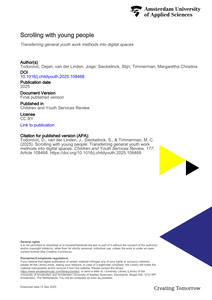ObjectiveIn this Lesson from the Field, we examine changes in the burden experienced by caregivers of persons who experience homelessness associated with lack employment, employability or education, and mental health challenges when the care recipient receives support from an outreach professional known as a social street worker (herein identified as worker). In addition, we focus on caregivers' perception of change in the quality of their relationship with the person for whom they care and whether the caregivers receive support from the worker.BackgroundIn the Netherlands, due to the transformation toward a participation society, persons living in compromised circumstances must increasingly rely on caregivers for support and shelter instead of relying on services, such as support from social community teams.MethodsWorkers provided by a Dutch organization covering the northwest of the Netherlands gained the consent of their clients to contact the clients' caregivers. Caregivers were invited to participate in the research and completed consent. A total of 111 caregivers of persons receiving support from workers completed surveys.ResultsCaregivers who had more contact with the worker worried less about the person for whom they provided care. No changes were found regarding tension between caregivers and the person for whom they cared. Most caregivers (73%) perceived positive changes in the quality of the relationship with the person for whom they provided care, and 52% received support from the worker.ConclusionMost carers did not perceive changes in their burden, but did perceived positive changes in the quality of the relationship with the person for whom they cared and received support themselves.ImplicationsOur study underpins the need to recognize the caregiver's burden of caregivers who support marginalized people, to connect with these caregivers, and to support them.
MULTIFILE

A good working relationship between clients and professionals increases the chances of better intervention outcomes for clients. A longitudinal cohort study was carried out amongst clients who were in touch with professionals from a Dutch social street work (SSW) organisation. We used a questionnaire to examine client perspectives (n = 332) on the relational and goal-oriented part of the working relationship after a minimum of 8 months of contact with SSW. We furthermore examined to what extent both parts of the working relationship were influenced by client characteristics and SSW metrics. Clients were asked to reflect on the relational part and the goal-oriented part of the working relationship. Clients who only met SSW professionals in public areas perceived a weaker working relationship in both aspects. A stronger relational and goal-oriented working relationship was perceived when receiving more practical support. Clients who had been in contact with an SSW professional for a long period of time perceived a weaker goal-oriented working relationship. This study shows that a working relationship, with both relational and goal-oriented aspects, can be established between workers and marginalised people in their daily environment. Frequent contact and providing practical support can improve both parts of the working relationship. Please refer to the Supplementary Material section to find this article's Community and Social Impact Statement.
MULTIFILE

With the increasing significance of the online lifeworld in the lives of adolescents, youth work must adapt its methods to support young people’s personal development and social participation in this hybrid online space. To date, there is limited knowledge on how youth workers can effectively employ methodical actions in the online environment. This paper draws on established offline youth work methods to explore their potential transferability to the online context. The research question guiding this study is: How can offline youth work methods be used in the online lifeworld to support adolescents’ developmental needs? Using the Change Laboratory method, 26 youth workers from 14 youth work organisations in the Netherlands participated in this research. The findings suggest that while offline methods provide a valuable resource, they cannot be directly transferred to the online context without adaptation. Instead, they offer a framework for seven specific methodical actions that can be adapted or developed for the online context. They are: 1) Increasing online visibility and accessibility, 2) Orienting, 3) Signalling, 4) Making contact, 5) Building meaningful relationships, 6) Assessing needs, and 7) Providing support. By identifying these seven methodical actions which are crucial for addressing the developmental needs of adolescents online, this paper contributes to the growing body of knowledge on youth work in the online lifeworld.
DOCUMENT
